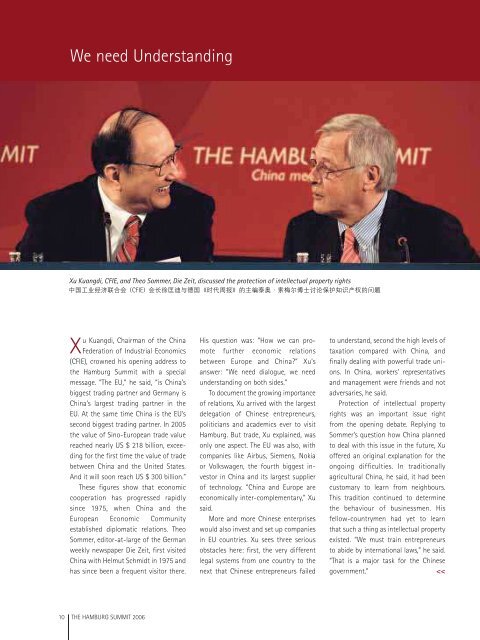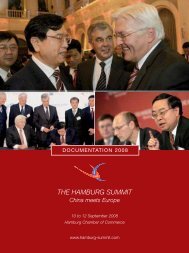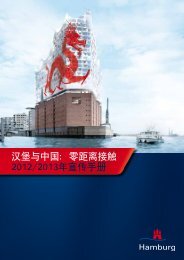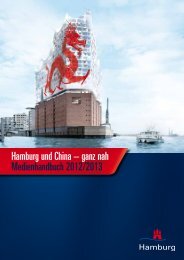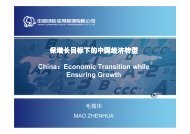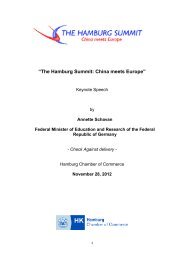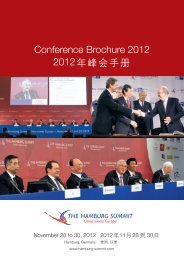Documentation Brochure - Hamburg Summit
Documentation Brochure - Hamburg Summit
Documentation Brochure - Hamburg Summit
- No tags were found...
You also want an ePaper? Increase the reach of your titles
YUMPU automatically turns print PDFs into web optimized ePapers that Google loves.
We need Understanding<br />
Xu Kuangdi, CFIE, and Theo Sommer, Die Zeit, discussed the protection of intellectual property rights<br />
<strong>Hamburg</strong>´s First Mayor Ole von Beust (left) was one of the many attendees of the opening session<br />
Xu Kuangdi, Chairman of the China<br />
Federation of Industrial Economics<br />
(CFIE), crowned his opening address to<br />
the <strong>Hamburg</strong> <strong>Summit</strong> with a special<br />
message. “The EU,” he said, “is China’s<br />
biggest trading partner and Germany is<br />
China’s largest trading partner in the<br />
EU. At the same time China is the EU’s<br />
second biggest trading partner. In 2005<br />
the value of Sino-European trade value<br />
reached nearly US $ 218 billion, exceeding<br />
for the first time the value of trade<br />
between China and the United States.<br />
And it will soon reach US $ 300 billion.”<br />
These figures show that economic<br />
cooperation has progressed rapidly<br />
since 1975, when China and the<br />
European Economic Community<br />
established diplomatic relations. Theo<br />
Sommer, editor-at-large of the German<br />
weekly newspaper Die Zeit, first visited<br />
China with Helmut Schmidt in 1975 and<br />
has since been a frequent visitor there.<br />
His question was: “How we can promote<br />
further economic relations<br />
between Europe and China” Xu’s<br />
answer: “We need dialogue, we need<br />
understanding on both sides.”<br />
To document the growing importance<br />
of relations, Xu arrived with the largest<br />
delegation of Chinese entrepreneurs,<br />
politicians and academics ever to visit<br />
<strong>Hamburg</strong>. But trade, Xu explained, was<br />
only one aspect. The EU was also, with<br />
companies like Airbus, Siemens, Nokia<br />
or Volkswagen, the fourth biggest investor<br />
in China and its largest supplier<br />
of technology. “China and Europe are<br />
economically inter-complementary,” Xu<br />
said.<br />
More and more Chinese enterprises<br />
would also invest and set up companies<br />
in EU countries. Xu sees three serious<br />
obstacles here: first, the very different<br />
legal systems from one country to the<br />
next that Chinese entrepreneurs failed<br />
to understand, second the high levels of<br />
taxation compared with China, and<br />
finally dealing with powerful trade unions.<br />
In China, workers’ representatives<br />
and management were friends and not<br />
adversaries, he said.<br />
Protection of intellectual property<br />
rights was an important issue right<br />
from the opening debate. Replying to<br />
Sommer’s question how China planned<br />
to deal with this issue in the future, Xu<br />
offered an original explanation for the<br />
ongoing difficulties. In traditionally<br />
agricultural China, he said, it had been<br />
customary to learn from neighbours.<br />
This tradition continued to determine<br />
the behaviour of businessmen. His<br />
fellow-countrymen had yet to learn<br />
that such a thing as intellectual property<br />
existed. “We must train entrepreneurs<br />
to abide by international laws,” he said.<br />
“That is a major task for the Chinese<br />
government.”


